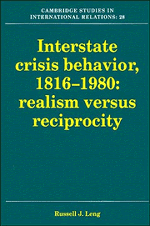Book contents
- Frontmatter
- Contents
- List of figures
- List of tables
- Preface
- 1 REALIST AND PSYCHOLOGICAL PERSPECTIVES
- 2 METHODOLOGY
- 3 THE CRISIS STRUCTURE AND WAR
- 4 PATTERNS OF BEHAVIOR
- 5 STRUCTURE, BEHAVIOR, AND OUTCOMES
- 6 INFLUENCE TACTICS
- 7 INFLUENCE STRATEGIES
- 8 RECIPROCATING INFLUENCE STRATEGIES
- 9 SUMMARY AND CONCLUSION
- EPILOGUE: THE 1990–1991 CRISIS IN THE PERSIAN GULF
- Appendices
- Notes
- References
- Index of names
- Index of subjects
- Titles in the series
6 - INFLUENCE TACTICS
Published online by Cambridge University Press: 05 February 2010
- Frontmatter
- Contents
- List of figures
- List of tables
- Preface
- 1 REALIST AND PSYCHOLOGICAL PERSPECTIVES
- 2 METHODOLOGY
- 3 THE CRISIS STRUCTURE AND WAR
- 4 PATTERNS OF BEHAVIOR
- 5 STRUCTURE, BEHAVIOR, AND OUTCOMES
- 6 INFLUENCE TACTICS
- 7 INFLUENCE STRATEGIES
- 8 RECIPROCATING INFLUENCE STRATEGIES
- 9 SUMMARY AND CONCLUSION
- EPILOGUE: THE 1990–1991 CRISIS IN THE PERSIAN GULF
- Appendices
- Notes
- References
- Index of names
- Index of subjects
- Titles in the series
Summary
When they find themselves faced with escalating crises, statesmen must ask what influence techniques will most effectively contribute to the protection of their interests without plunging their states into costly wars. The theoretical discussion in Chapter 1 introduced two competing perspectives on crisis bargaining: the realist and psychological perspectives. Working within the realist tradition, conflict strategists have devoted their attention to techniques of manipulative bargaining designed to demonstrate superior resolve in escalating conflicts. From this perspective, coercive inducements are presumed to be the predominant, and most effective, influence techniques. Consequently, a good deal of the theorizing of conflict strategists is devoted to the credible use of threats and punishments. Crisis bargaining becomes, in Kahn's words (1965:16), “a competition in risk-taking,” in which the risk is the outbreak of war.
The main restraint on a potentially reckless pursuit of a strategy of escalating coercive influence tactics lies in the classical realist admonition to demonstrate prudence (Morgenthau, 1960:10). Realists recognize that prudent diplomacy frequently requires some degree of accommodation (see Morgenthau, 1960:ch. 31). For classical realists, the issue must be resolved through a careful calculation of capabilities and interests. Prudential considerations require national leaders to recognize the limits of their power, and to seek an accommodative settlement if the costs and risks of war outweigh the objectives being pursued. On the other hand, conflict strategists note that the credibility of coercive threats is tied to demonstrated commitments to carry them out (see Schelling, 1960). A militarized crisis represents the supreme test of a state's power and resolve. In such a situation, the line between the exercise of prudence and what may be perceived as a failure of nerve is not easily drawn.
- Type
- Chapter
- Information
- Interstate Crisis Behavior, 1816–1980 , pp. 113 - 135Publisher: Cambridge University PressPrint publication year: 1993



